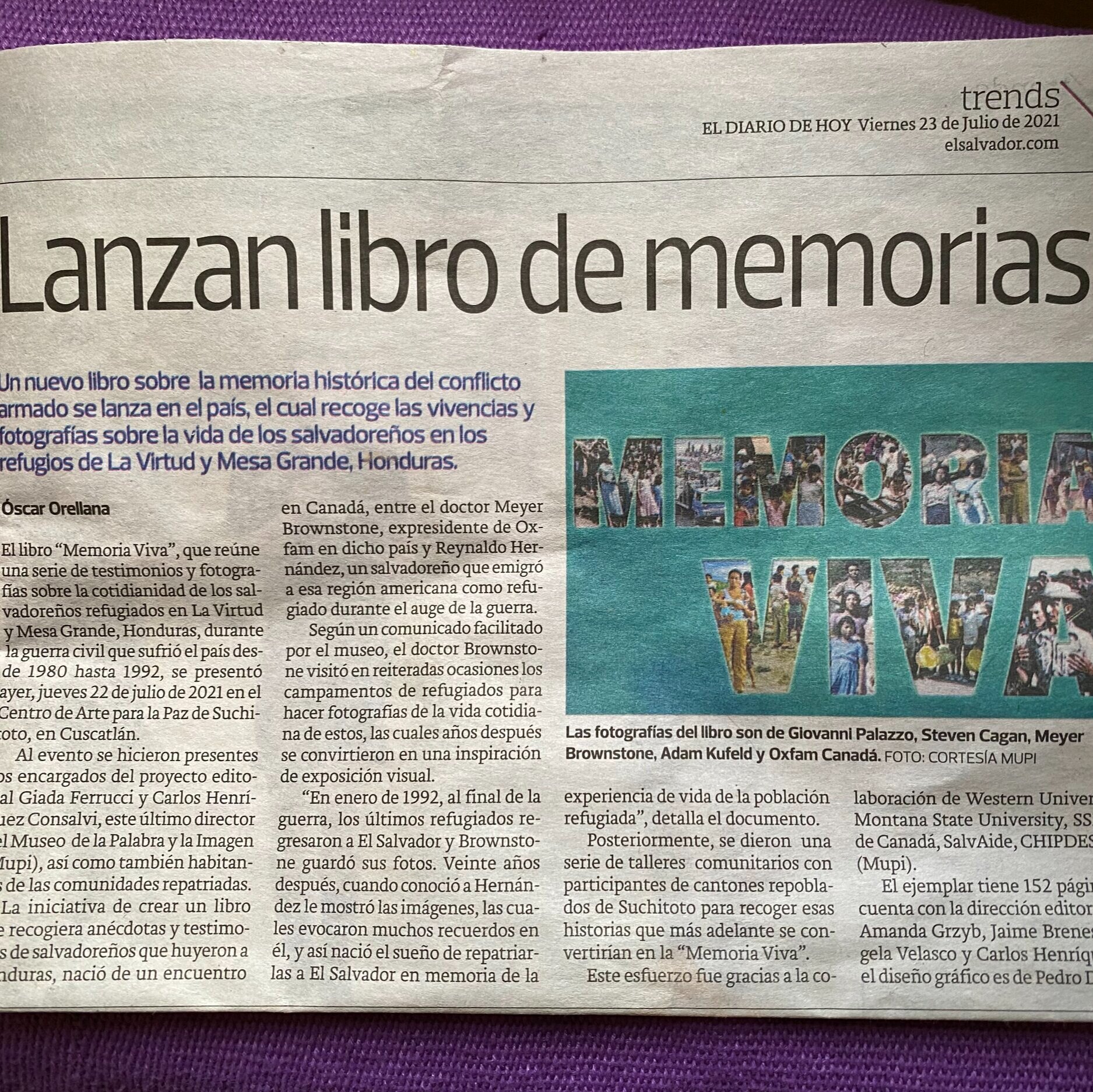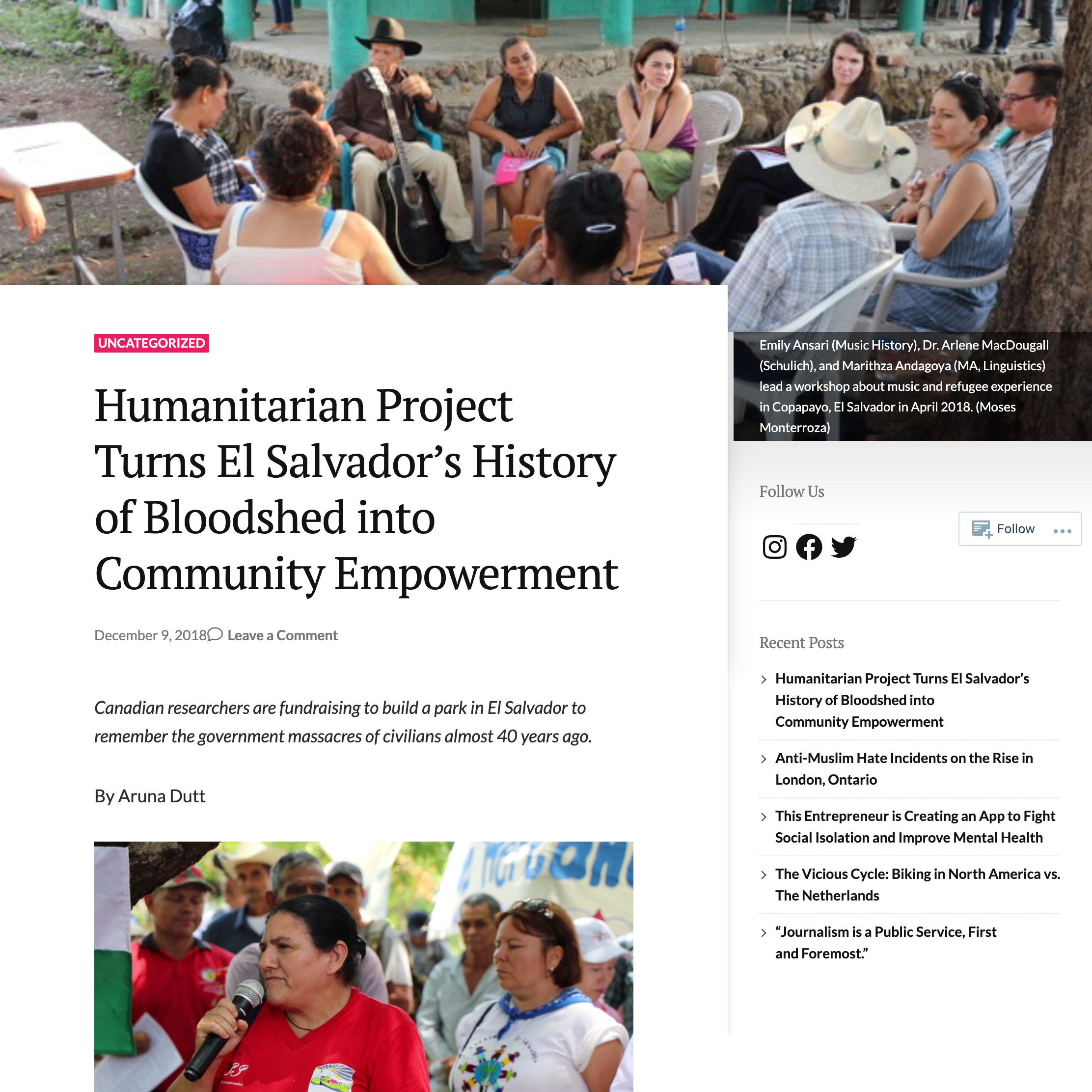About Surviving Memory in Postwar El Salvador
The Surviving Memory in Postwar El Salvador collaborative research initiative is an international partnership of survivors, scholars, artists, lawyers, museums, architects, community organizers, municipal governments, civil society organizations and mental health professionals who are committed to documenting the history of the Salvadoran Civil War (1980-1992) and preventing future violence. Using decolonial and participatory methodologies, our goal is to engage in high-impact, community-driven research projects, oral histories, and accessible knowledge sharing activities that approach historical memory work holistically through the intersections of justice; art, music, and theatre; intergenerational education; documentation and testimonies; mental health and healing; commemoration; environmental reparation; and local economic reconstruction. Our contributing members include nationals of El Salvador, Argentina, Australia, Bahrain, Belgium, Canada, Colombia, Ecuador, England, Denmark, Germany, Italy, Mexico, the Netherlands, Nicaragua, Nigeria, Poland, Venezuela, and the United States. For our team, recovering wartime narratives means working in solidarity with Salvadorans, reconstructing history from the bottom-up, supporting intergenerational education, and using participatory methodologies.
All of our projects are developed collaboratively to meet the needs of Salvadoran communities and seek justice and dignity for victims and survivors. This research is supported by the Social Sciences and Humanities Research Council of Canada (SSHRC), Western University, KU Leuven, Aarhus University, Carleton University, The University of El Salvador, the Central American University, ACISAM – Association of Training and Research for Mental Health (El Salvador), ASALCA – The Salvadoran Canadian Association (Canada), Asociación Sumpul (El Salvador) CCR – Association of Communities for the Development of Chalatenango (El Salvador), Centro Arte para la Paz (El Salvador), The Committee of Surviving Historical Memory in Arcatao (El Salvador), CRIPDES – The Association for the Development of El Salvador (El Salvador), FutureWatch (Canada), Global MINDS Collective (Canada), Mindfulness Without Borders (Canada), Museo de la Palabra y la Imagen (El Salvador), Pro Vida -Salvadoran Association for the Humanitarian Aid (El Salvador), Tutela Legal “Dra. Maria Julia Hernández (El Salvador), and the Salvadoran municipalities of San José Las Flores, Las Vueltas, Arcatao, Nueva Trinidad, and Suchitoto.
Guiding Principles of Partnership and Collaboration
Horizontal Governance: The overarching governance structure of our research initiative is horizontal, consultative, cooperative, and consensus based. All partners, partner communities, collaborators, and co-applicants are equal partners and have agreed to share in decision-making about research and research-creation priorities, knowledge sharing activities, and resource allocation.
Participatory Methodology: As a community-based research initiative, we employ participatory and decolonial methodologies. All participants are respected as knowledge-holders, co-researchers, and co-creators, and our team accompanies communities through collaborative research processes that amplify the voices of survivors and meet local community needs.
Equity, Diversity, and Inclusion: We promote equity, diversity, and inclusion in all of our activities and practices, which should be free of discrimination on the basis of gender, age, race, religion, ethnicity, sexual orientation, ability, education, reading/writing skills or economic status. Three committees focused on the interests of youth, women, and students provide feedback on issues of particular concern to their constituencies.
Holistic Approach: Our approach to documenting the history of the Salvadoran Civil War is holistic and trauma-informed. We strive to collaborate in innovative ways, with sensitivity to psychosocial contingencies, across traditional scholarly disciplines, sectors, communities, and borders.
HQP Training: We prioritize training for students, medical residents, and postdoctoral scholars. Our research team and institutional partners strive to integrate trainees into all aspects of our work, including research development, field research, workshop design and facilitation, transcription and translation, co-authoring and co-creation, and development of integrated knowledge sharing activities.
Community Capacity-Building: We prioritize capacity-building in Salvadoran communities and partner organizations, including skills training workshops, support for local strategic planning, and the incorporation of community members – particularly youth – into our research teams.
Intergenerational Education: We prioritize intergenerational education and actively facilitate the bi-directional exchange of knowledge between youth and civil war survivors at community events, in school settings, and through the creation of books, films, artistic works, and education guides.
Accessibility: We recognize that there are varying levels of literacy in our partner communities, and we strive to make all of our outcomes accessible orally through community meetings, videos and films, radio broadcasts, and audio voiceovers.
Open Access: All of our outcomes, including scholarly publications, are open access and available in Spanish, English, and French through journals, books, the Surviving Memory in Postwar El Salvador website, our Maps and Open Data site, and our digital archive projects.
Project Sustainability: Over the course of our the project, we will work with our partner communities and organizations on sustainability plans and strategic planning. We will support grant writing initiatives that will fortify local capacity to continue historical memory projects beyond the tenure period of our SSHRC grant.
Reducing our Carbon Footprint: Our team is committed to reducing the carbon footprint of our project by balancing the importance of face to face meetings and field research with environmentally responsible travel. We will use video conferencing whenever possible, and we will privilege research plans that require fewer international flights and longer stays, including long-term internships and fieldwork placements for our trainees.
"Surviving Memory” in the Media
Revista la Brújula (february 25, 2022)
“Organización inicia Proyecto de Reconstrucción de Memoria Histórica en El Salvador”
Diario Co Latino (February 25, 2022)
“CRIPDES lanza proyecto de rescate y difusión de la Memoria Histórica”
la prensa grafica (February 25, 2022)
“Buscan crear registro de masacres cometidas en el conflicto armado salvadoreño”
YSUCA (February 24, 2022)
“Organizaciones buscan rescatar la memoria histórica de El Salvador”
FIMS NEWS (February 7, 2022)
“Researcher from El Salvador to join FIMS as Postdoctoral Scholar”
el diario de hoy (July 23, 2021)
CONTRA PUNTO (JULY 22, 2021)
Western News (June 16, 2021)
Diario Co Latino (May 22, 2019)
“Equipo multidisciplinario internacional en pro de la 'Memoria Histórica' salvadoreña”
Radio Canadá Internacional (april 9, 2019)
GLOBAL ACTION (December 9, 2018)
“Humanitarian Project Turns El Salvador’s History of Bloodshed into Community Empowerment”
Western News (November 9, 2018)
CBC News (August 29, 2018)
“London researchers want to recover El Salvador’s forgotten past”
THE X FM (february 12, 2018)
Inter Press Service (august 16, 2017)
“Víctimas de massacres buscan impulsar Turismo histórico en El Salvador”
Western News (November 30, 2016)
“Team looks to rescue, reunite refugees with their history”
For more information about our projects, please contact Dr. Amanda Grzyb, Associate Professor at Western University: agrzyb@uwo.ca or use the Contact form.
Find us on Facebook: Memoria Histórica Sobreviviente / Surviving Memory - El Salvador
“It is of no use to remember and tell the story if we don’t do anything to see it doesn’t happen again. We don’t want other generations to go through what we went through. ”
























